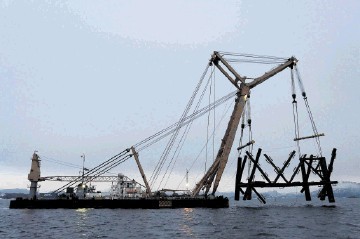
I have been a harsh critic of the current decommissioning removal plans; this is on the basis that removal provides little benefit for the environment, the economy or society.
I put these concerns to the UK Department for Business, Energy and Industrial Strategy (Beis) and outlined my alternative of using the money saved from leaving clean infrastructure in place for green energy projects.
My contention was that green energy would provide a much more sustainable outcome for people, company’s profits and the planet.
After many months of waiting, I finally received a letter from Beis responding to my decommissioning exposition. It was from a Beis civil servant and not Greg Clark, because the Secretary of State for Business, Energy and Industrial Strategy has not got time to reply.
It is heartening to note that Mr Clark has much more important issues to occupy himself, much more significant than a £50billion spend funded to a large extent by the taxpayer.
That aside, the Beis response can be paraphrased as we will follow Ospar*, a pan-European body which was set-up to protect the marine environment of the north-east Atlantic. The letter also pointed out that the taxpayer should have a “keen interest”.
So here I am Mr Clark, a taxpayer with a keen interest and I would like to ask you for a reasoned response to the following.
Why is removal good for the environment? The marine habitat experts are saying that at best it might be neutral or removal will cause more harm.
In addition, removal is very energy intensive resulting in associated CO2 and other harmful air emissions. Where is the Beis environmental justification for removal?
What is the economic benefit for the nation in removal?
What are the benefits for society? Removal provides little employment and the product, a fraction of the North Sea sea bed, provides society with what? Compare that with the societal and economic benefits from investing the money saved into green energy.
Climate change deniers have been criticising me for proposing green energy as an alternative for the money saved from removal. So here are some other alternatives for the money:
- Recovering our manufacturing base
- Health
- Education
- Tackling poverty
- Tackling youth unemployment
- Improved flood protection
- Marine conservation
The list is endless, just not something as pointless as asset removal.
Mr Clark, on the basis that the Ospar directives are resulting in a poor outcome for the environment, the economy and society, why are we not challenging Ospar? To quote Mr Bumble – “the law is an ass”.
Mr Clark, why don’t we stop removal activities now and conduct a full sustainability review then take an informed decision?
Tom Baxter is a senior lecturer in chemical engineering at Aberdeen University.
*Under Ospar rules, installations must be removed in their entirety once they reach the end of their production cycle, though exceptions have been made for structures installed before the rules came into effect.
Recommended for you
